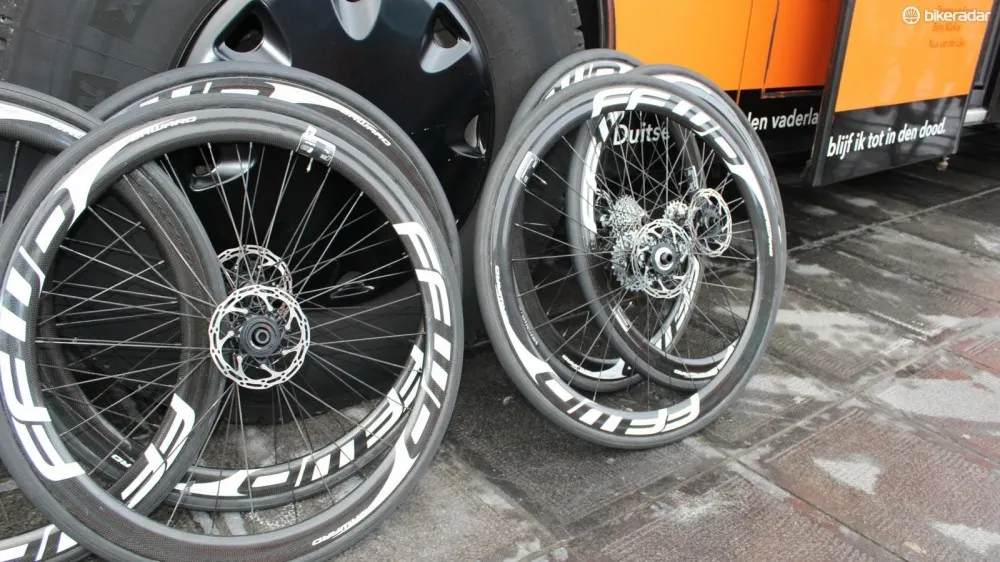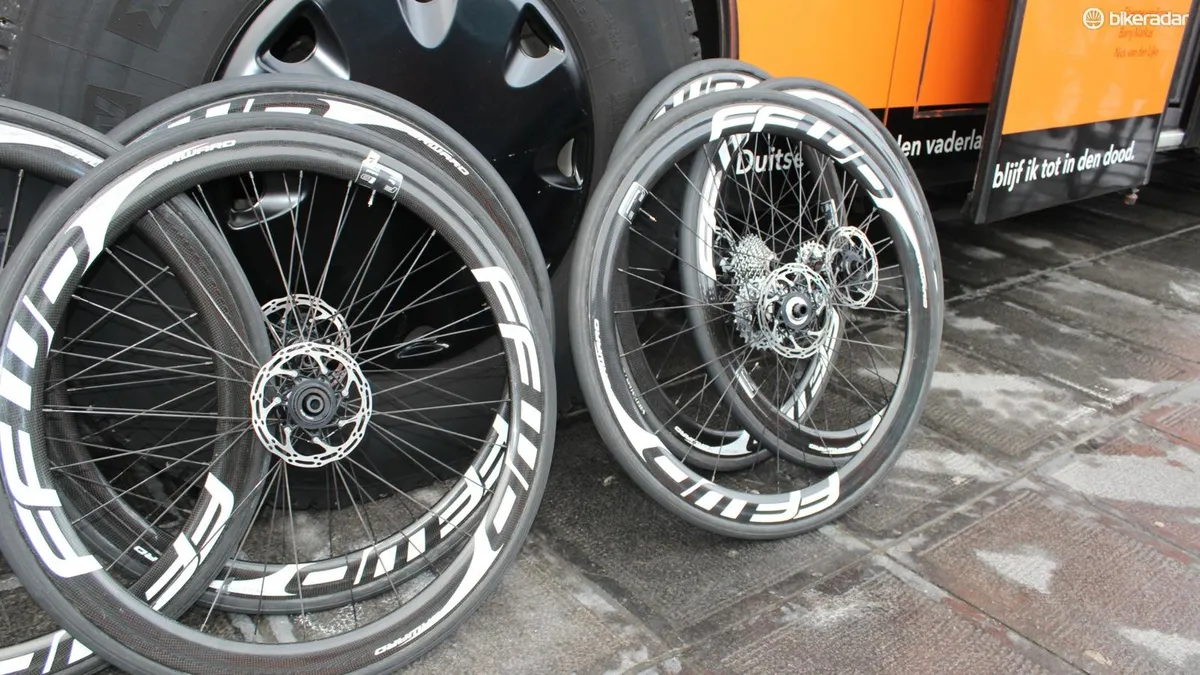In the wake of the UCI banning disc brakes from professional road racing following injury at Paris-Roubaix, bike brands and drivetrain companies have defended their products with varying levels of vigor.
Some, like Shimano, defer to the pro riders' decisions. Others, Cannondale for instance, argue that disc brakes are a benefit for rider safety, not a deterrent to it. And others, such as former rider and current bike company executive Baden Cooke, reckon the whole thing has been blown out of proportion.
>Related: Could disc brake guards be a solution (to a problem that may not exist)
"For me personally, coming from a racing side, I was against disc brakes from the outset because of the weight," says Cooke, a co-owner of Factor Bikes. "If you want to use disc brakes, I have no issue. I wouldn’t have an issue with cutting myself. That’s a bit of a joke. When you consider the things that we would slam into – posts, curbs, parked cars, et cetera — a brake is the least of your problems."
A brief history of road discs’ brief appearance in the pro peloton
After a limited trial period at the end of last season where teams could try road disc brakes at two events, professional cycling’s ruling body, the UCI, deemed 2016 as a trial year, during which teams could use disc brakes whenever they liked. Use of discs began as a trickle, not a flood. It wasn’t until the Tour of Flanders in early April that Lampre-Merida became the first WorldTour team to field a full squad on discs. All other WorldTour teams opted to continue on rim brakes.
The following week, Movistar rider Francisco Ventoso injured his left leg at Paris-Roubaix, and published an open letter about rotors being "giant knives". Other riders voiced their support of banning discs, and the UCI quickly announced that the technology would no longer be allowed in pro racing until further notice.

At the Tour of Flanders, Lampre-Merida became the first — and still only — WorldTour team to run all discs at a major event
Bike and component makers react
BikeRadar has reached out to a number of companies that make disc brakes or disc-brake bikes. Some have declined to respond, or given short noncommittal answers like the following from Shimano and Specialized.
"It's the choice of the rider which brake system he or she prefers," Shimano spokesman Eric Doyne says. "Shimano does not oblige sponsored teams or riders to use any particular brake system."
"Our first concerns are for the safety of riders, as we also seek to provide them with products that provide a performance benefit," is the line from Specialized spokesman Sean Estes. "As part of the WFSGI, we are working to find a solution with the UCI."
The World Federation Sporting Good Industry (WFSGI) is a collaborative group of manufacturers that works with groups like the Olympic Committee and the UCI to agree on product standards, among other things.
Other companies, such as SRAM and Cannondale, are a bit bolder in defending their technology.
"SRAM obviously supports the use and proliferation of disc brakes in the professional road peloton. Disc brakes are simply a better system of braking that provides more power, better modulation, and a safer environment due to their superior performance," SRAM road PR manager Michael Zellmann tells BikeRadar. "We remain engaged with the UCI and WFSGI and will continue to participate in their process.
"The fact is, disc brakes will prevent more crashes, potential injuries, and provide riders with much greater control of the bike in all conditions," Zellmann adds, adding that this applies to pros and everyday riders alike. "The improved control of disc brakes is what you can point to. As bikes and riders get faster – like nearly every motorized vehicle – they require better braking, and we feel disc brakes absolutely address this need."
At Cannondale, road global marketing manager James Lalonde goes a step further, saying that Ventoso’s letter highlighted a misconception that riders have about disc brakes.
"The crash at Roubaix is unfortunate and we hope Fran Ventoso has a quick recovery," Lalonde says. "We take rider safety seriously at Cannondale and support the use of disc brakes precisely because, by offering superior control and modulation, they make for better and safer riding overall. One of the big misconceptions about discs, one that was front and center in Ventoso’s letter, is that discs’ sole purpose is to supply more braking power, when in fact, the main advantage to discs is that they provide better braking, not just more power. They are more consistent in all conditions, and vastly more controllable in the wet. So, are they unsafe for for pro racing? I don’t think so. Are they unsafe for general road consumers? Again, I don’t think so.
"It would be irresponsible of us as an industry to not provide our riders with the very best braking possible. Yes, there are risks with disc brakes, as there are with sharp-toothed chainrings and bladed spokes, and we should be constantly working to minimize the potential for harm," Lalonde continues. "However, with the current technology, the greatest potential benefit for rider safety would be to accelerate the adoption of discs, not impede its progress."

Pro teams that used disc wheels may now be storing them for a while...
As for Merida, which put itself at the heart of the debate, the company reiterates its commitment to hydraulics.
"Merida believes in the future of disc brakes on road bikes as we believe that the added safety aspects — better modulation and braking performance in particular in the wet and when cornering, avoidance of rim heat-up on long descents, et cetera — will help the prevention of crashes and outweigh the potential risks as passive members of mass crashes," says Merida PR manager Michael Wilkens.
"However, the happenings of the recent event has shown that further disc technology improvements should be made to reduce potential risks — for example, rotors with rounded edges — and we are in communication with disc brake manufacturers to push this development forward."
'I don’t think they are dangerous – I think that’s bullshit'
As a retired veteran elite racer and now a co-owner of a bike brand that had road discs nearly a decade ago, Baden Cooke has a unique perspective. While, as mentioned above, he wouldn’t use them for racing because of the added weight, he says his company is designed a disc bike that can handle clinchers up to 32mm.
"I was a pro for 14 years. I would brake harder and later than anyone else when I was a rider. I would come into a corner on the front wheel," Cooke says, explaining why he didn’t see the need for discs for racing. "I have also noticed that the brake a lot of the time rubs the disc. But just the weight on its own would be enough not to use them. I just don’t see any need. If they change the weight limit, maybe I would go back and have a look at it.
"Maybe in the rain. Maybe. But even then… the fact that you couldn’t brake very hard in the rain, was the reason you weren’t dropping yourself," Cooke adds. "You had to slow down with a lot of clearance. In the rain, if the brakes were more effective, you might have more crashes.
"But I don’t think they are dangerous. I think that’s bullshit," he concludes. “For amateur riders – I think this whole thing has been blown out of proportion. If you are in a race where the UCI rules don’t apply, it wouldn’t be dangerous at all. I simply wouldn’t use it because it don’t think it's advantageous. If anyone else wants to use it, go ahead."



